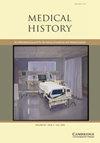Medicine and the critique of war: military psychiatry, social classification and the malingering patient in colonial India
IF 1.1
2区 哲学
Q4 HEALTH CARE SCIENCES & SERVICES
引用次数: 3
Abstract
Abstract The treatment of injured Indian soldiers in Britain during WWI deployed particular ways of recording injuries and using them to make judgments about loyalty to the Imperial Army by assessing the soldier’s ability to malinger. This was possible by using personal correspondences between soldiers and their families for ethnographic ends ie. to determine susceptibility to develop mental illness through a soldier’s ethnic background and whether he was from the so-called ‘martial races’ or not. This classificatory knowledge as well as the suspicion towards exaggerated symptoms was also inherited by Indian psychiatry after partition. However, while these psychiatrists reproduced some colonial biases about susceptibility of illness, they were much more receptive to considering the social experience of patients including their kinship relations at home and in the military. By the end of WWII, symptoms came to be regarded as signs of recovery and readjustment to social relations to make a case for the lasting impacts of war on the soldier’s mental and physical health.医学与战争批判:军事精神病学、社会分类和殖民印度的装病病人
第一次世界大战期间,英国对受伤的印度士兵的治疗采用了特殊的记录受伤情况的方法,并通过评估士兵的装病能力来判断他们对帝国军队的忠诚度。这可以通过使用士兵和他们家人之间的个人通信来实现。通过士兵的种族背景来确定其患精神疾病的易感性,以及他是否来自所谓的“军事种族”。这种分类知识以及对夸大症状的怀疑也在分裂后被印度精神病学所继承。然而,虽然这些精神病学家再现了一些关于疾病易感性的殖民偏见,但他们更容易接受考虑患者的社会经验,包括他们在家庭和军队中的亲属关系。到第二次世界大战结束时,症状开始被视为恢复和重新适应社会关系的迹象,从而证明战争对士兵身心健康的持久影响。
本文章由计算机程序翻译,如有差异,请以英文原文为准。
求助全文
约1分钟内获得全文
求助全文
来源期刊

Medical History
医学-科学史与科学哲学
CiteScore
1.60
自引率
0.00%
发文量
25
审稿时长
>12 weeks
期刊介绍:
Medical History is a refereed journal devoted to all aspects of the history of medicine and health, with the goal of broadening and deepening the understanding of the field, in the widest sense, by historical studies of the highest quality. It is also the journal of the European Association for the History of Medicine and Health. The membership of the Editorial Board, which includes senior members of the EAHMH, reflects the commitment to the finest international standards in refereeing of submitted papers and the reviewing of books. The journal publishes in English, but welcomes submissions from scholars for whom English is not a first language; language and copy-editing assistance will be provided wherever possible.
 求助内容:
求助内容: 应助结果提醒方式:
应助结果提醒方式:


